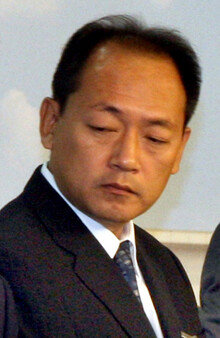hankyoreh
Links to other country sites 다른 나라 사이트 링크
In Japan, S. Korean teachers push to gain recognition as full-fledged teachers

“I’ve always taught my students that even a foreigner can be a teacher or a civil servant. If I accept discrimination, I will have been telling lies all this time.”
So says Han Yuchi, a 43 year-old Korean citizen who also goes by the Japanese name Yuji, who teaches at a public school in Kobe, Japan.
Han was the first-ever foreign teacher in the city of Kobe. Having taught for 16 years, he had just been promoted to the position of “associate head teacher” for his grade, which is accompanied by administrative duties, in March in recognition of his teaching and work abilities. Now, a month later, the city’s educational commission has told him that a Korean who is not a Japanese citizen may not hold the position of “associate head teacher.” The school has also removed him from its school affairs committee and from his position as the vice chairperson of seven other school committees.
Kobe education officials and Han’s school are quoting 1991 Japanese Education Ministry guidelines that say a foreigner in Japan may only be promoted as high as a “full-time lecturer without time limit on appointment” who is entrusted only with “assisting” a Japanese teacher.
Han calls the ministry’s guidelines “ethnic discrimination and a violation of civil rights that has no legal basis.” The Association for Human Rights for Foreigners in Japan and local civic groups have lodged a formal protest with city education officials, claiming that the Education Ministry guidelines not only go against the spirit of the Korea-Japan Memorandum, they also go against the “fair treatment” clause regarding Japanese and non-citizens in Japan’s version of the Labor Standards Law.
In 1991, Korea and Japan signed a document called the “Memorandum on the Results of Agreement Based on the Pact on Korean and Japanese Legal Status,” and Japan soon started allowing the appointment of Korean citizen school teachers. The Japanese Education Ministry, however, without legal basis, drafted its own internal guidelines limiting citizens of foreign countries to the position of full-time lecturer. There are about 200 foreign citizen teachers in Japanese public schools today.
Han and members of the Association for Human Rights for Foreigners in Japan held a press conference on the grounds of Korea’s National Assembly on October 28 to attract the Korean government’s interest in the issue of discrimination against Korean teachers in Japan.
Katsuharu Konishi, general secretary of the National Education Research Center for Foreigners in Japan said that 90 percent of ethnic Korean citizens in Japan attend Japanese schools instead of Korean-run schools.
Katsuharu Konishi, general secretary of the National Education Research Center for Foreigners in Japan said that 90 percent of ethnic Korean Japanese or Korean citizens in Japan attend Japanese schools instead of Korean-run schools.
“This makes the presence of Korean teachers very precious and important,” said Katsuharu. “The Education Ministry’s guidelines and move by education officials in Kobe serve to stigmatize Korean teachers as ‘second class’ teachers who cannot be entrusted with administrative positions.”
Han said that Korean citizens who began teaching in 1991 are now reaching the point in their careers where they are starting to take on administrative responsibilities.
“We must correct what is a situation in which Koreans in Japan can never become official teachers,” he said.
Please direct questions or comments to [englishhani@hani.co.kr]
Editorial・opinion
![[Column] Has Korea, too, crossed the Rubicon on China? [Column] Has Korea, too, crossed the Rubicon on China?](https://flexible.img.hani.co.kr/flexible/normal/500/300/imgdb/original/2024/0419/9317135153409185.jpg) [Column] Has Korea, too, crossed the Rubicon on China?
[Column] Has Korea, too, crossed the Rubicon on China?![[Correspondent’s column] In Japan’s alliance with US, echoes of its past alliances with UK [Correspondent’s column] In Japan’s alliance with US, echoes of its past alliances with UK](https://flexible.img.hani.co.kr/flexible/normal/500/300/imgdb/original/2024/0419/2317135166563519.jpg) [Correspondent’s column] In Japan’s alliance with US, echoes of its past alliances with UK
[Correspondent’s column] In Japan’s alliance with US, echoes of its past alliances with UK- [Editorial] Does Yoon think the Korean public is wrong?
- [Editorial] As it bolsters its alliance with US, Japan must be accountable for past
- [Guest essay] Amending the Constitution is Yoon’s key to leaving office in public’s good graces
- [Editorial] 10 years on, lessons of Sewol tragedy must never be forgotten
- [Column] A death blow to Korea’s prosecutor politics
- [Correspondent’s column] The US and the end of Japanese pacifism
- [Guest essay] How Korea turned its trainee doctors into monsters
- [Guest essay] As someone who helped forge Seoul-Moscow ties, their status today troubles me
Most viewed articles
- 1[Column] The clock is ticking for Korea’s first lady
- 2[Correspondent’s column] In Japan’s alliance with US, echoes of its past alliances with UK
- 3After 2 months of delayed, denied medical care, Koreans worry worst may be yet to come
- 4[Column] Has Korea, too, crossed the Rubicon on China?
- 5[Editorial] When the choice is kids or career, Korea will never overcome birth rate woes
- 6Samsung barricades office as unionized workers strike for better conditions
- 7US exploring options for monitoring N. Korean sanctions beyond UN, says envoy
- 8US overtakes China as Korea’s top export market, prompting trade sanction jitters
- 9[Photo] Smile ambassador, you’re on camera
- 10Hong Se-hwa, voice for tolerance whose memoir of exile touched a chord, dies at 76